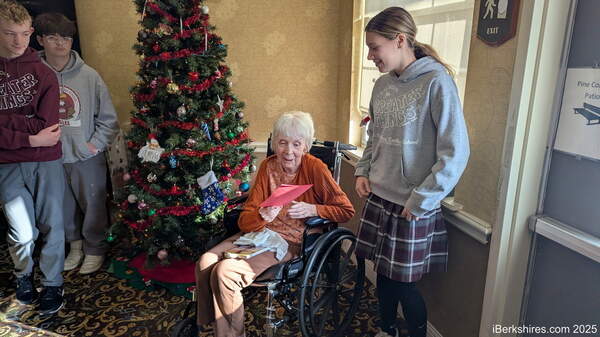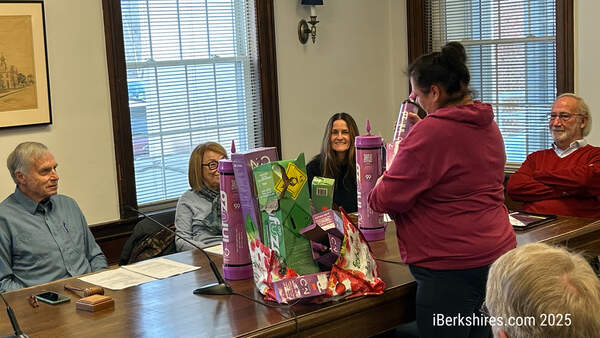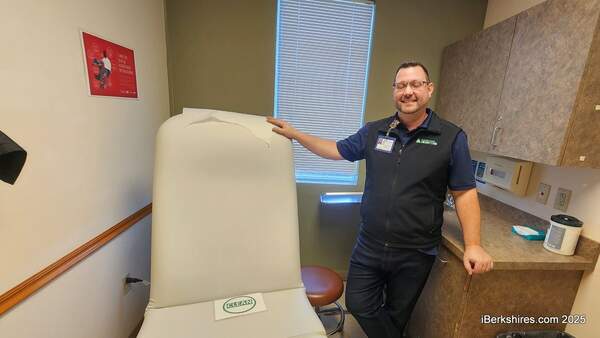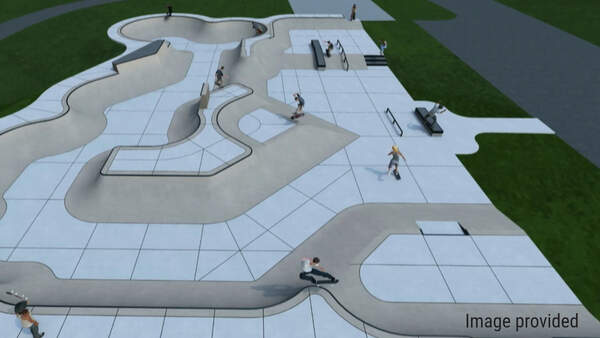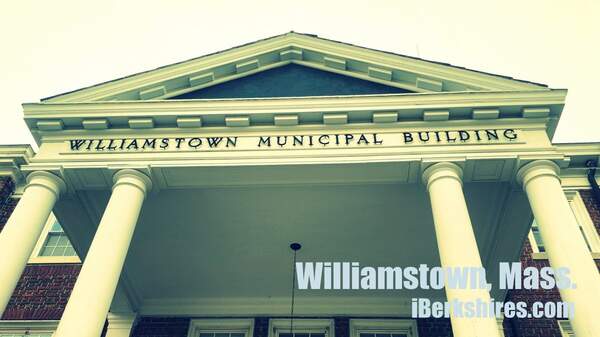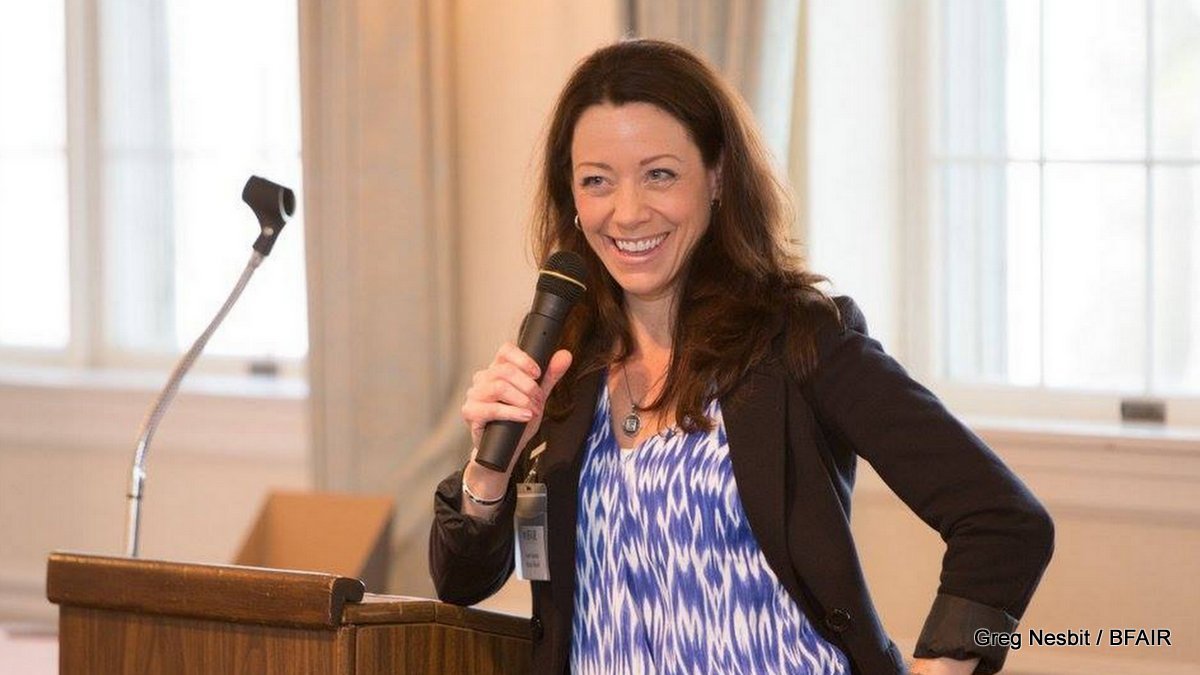
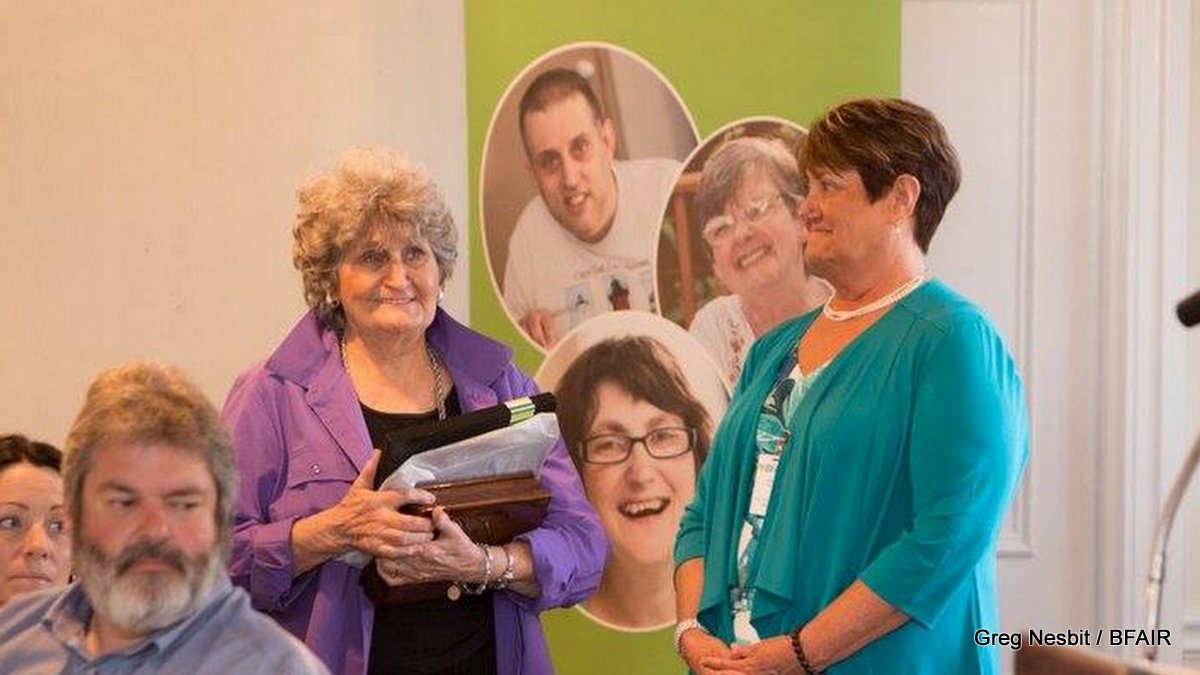
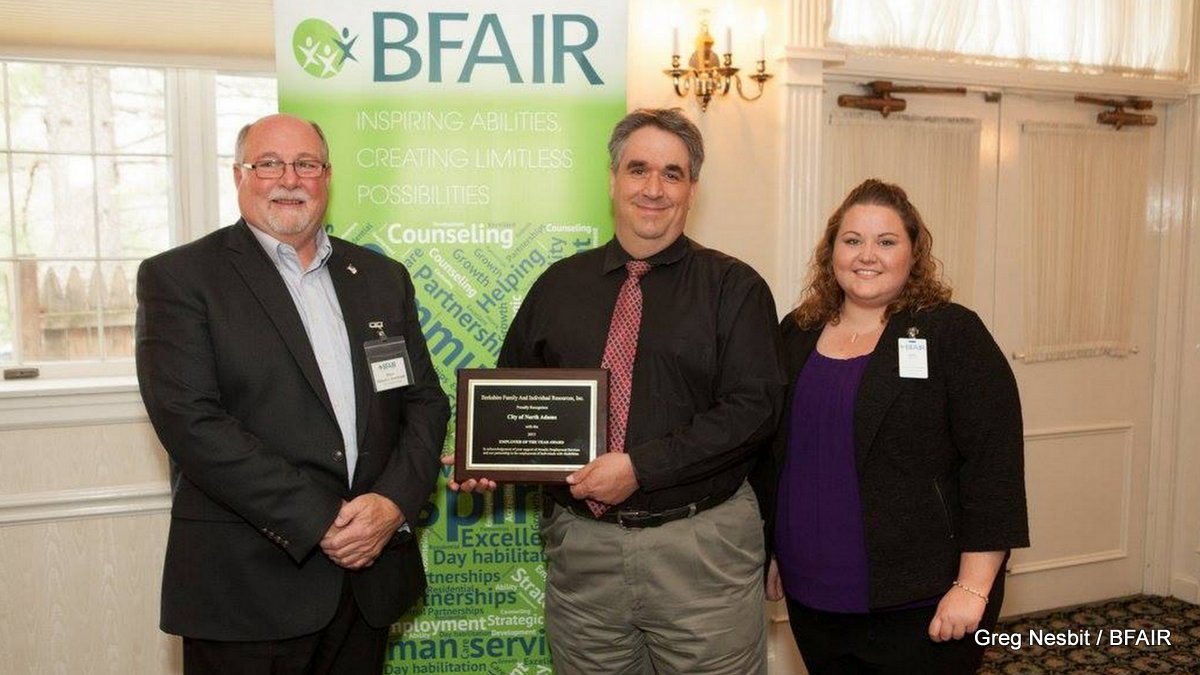
BFAIR Meeting Shows How Far Services Have Come
WILLIAMSTOWN, Mass. — It was a different world when Doris and Aldo Sartori began raising three boys with developmental disabilities.
Their second child, Dennis, was born with special needs in 1953. Twin boys, both with developmental impairments, came along 12 years later.
"Services available to help a family with their children consisted of little more than institutional care," BFAIR Executive Director Rich Weisenflue said on Friday morning. "That was what was recommended often by physicians.
"In Doris' case, that wasn't going to happen."
Berkshire Family and Individual Resources on Friday recognized Doris Sartori and her family with BFAIR's inaugural Lifetime Advocacy Award at the nonprofit's annual meeting.
Weisenflue explained just how difficult a road Doris and her late husband Aldo faced when they became advocates for their three children, one of whom, Bobby, now is a model employee at the North Adams Big Y through a program operated by BFAIR.
"The Individuals With Disabilities Act wasn't signed into law until 1990, granting a free and appropriate education to all children," Weisenflue said. "The Americans With Disabilities Act was also signed into law in 1990, giving people with disabilities equal opportunity to benefit from programs, services, education, employment and health care.
"The Sartoris did not have that education to lean on when they were advocating for any kind of services, support or education."
They also did not have BFAIR, incorporated in North Adams in 1994.
Today, BFAIR is a national- and state-accredited human service agency serving people with developmental disabilities and traumatic brain injuries throughout Western Massachusetts.
And, as shown at Friday's annual meeting, it is an agency growing in leaps and bounds.
"Highlights for the year include the renovation and opening of a satellite campus on Roberts Drive in North Adams," said Alex Kastrinakis, vice chairman of BFAIR's Board of Directors. "Habilitative services went through a [Commission on Accreditation and Rehabilitation Facilities] accreditation process and received accreditation for three years, not to mention the positive accolades by the site reviewers.
"BFAIR received a grant from the Department of Developmental Services to open a Memory Cafe, the only of its kind in Western Mass, for people living with memory issues and their caregivers. This grant will allow BFAIR to offer supportive, structured, cafe-style experiences with a focus away from the memory issues and on to recreational engagement.
"Our residential services program is expanding to meet the needs of a population living with acquired brain injuries."
In the next few weeks, BFAIR will open homes in Pittsfield and West Stockbridge to provide independence for people currently living in long-term care facilities.
Traumatic brain injury was a major focus of Friday's meeting, where the keynote speaker was Stacia Bissell, an educator from Pittsfield whose career was derailed and life turned upside down when she suffered a brain injury 4 1/2 years ago in a bicycle accident on the Ashuwillticook Rail Trail.
Speaking largely extemporaneously, Bissell captivated the hundreds who attended the morning meeting at the Williams Inn, detailing the challenges she has faced, her road to recovery and her determination not to stop recovering.
"I didn't know how strong I was until being strong was the only option," Bissell said.
Bissell, who awoke from her accident remembering nothing about it and could not figure out why she had a cast on her arm, said the concussion she suffered was not a major concern for the medical personnel who treated her.
"It's really surprising that they [were not more concerned] because apparently the story goes that I asked the same 12 questions over and over and over and over again in a rapid fire sort of way — apparently, according to my husband, about 30 times in a row," she said. "I just simply could not retain the answers.
"Question No. 9 was traumatic to me. … Question No. 9 occurred when I looked down and I had this ring on my finger. It belonged to a friend of mine who had died a few months before this. … I'd look at my hand and see the ring and say, 'Why am I wearing Pat's ring? Where's Pat?' And I'd be told she passed away, and I'd cry and I'd cry and I'd cry. Then I'd ask questions 10 through 12 and 1 through 8 and I'd get to Question No. 9 again, and I'd say, 'Why do I have Pat's ring on my finger?'
"Thirty to 40 times in a row, I had the additional trauma of learning that my friend had died."
Bissell was injured in September and returned to her job in the Pittsfield Public Schools in May on a part-time basis. She stayed in the job for two years, against her doctor's advice, because work was her identity, she said. She needed the job more than ever as her social circle began to contract because of people's reactions to her condition.
"My family and my husband's family — between them, I was called names, I was asked if I was 'faking it,' and I was mocked openly in front of others in public the first time I went out because I couldn't read the menu," she said. "One of my closest friends who works with the disabled population told me if I would just get up and start moving, I'd get all better.
"I learned sometimes your [social] circle decreases, but that increases its value."
With the help of her cognitive therapist, Bissell is learning to deal with the continuing symptoms of her brain injury, which include: chronic headaches and migraines; fatigue; sleep disorders; noise and light sensitivities; memory problems; depression; personality changes; speech, hearing, motor skill issues; difficulty assimilating in new environments; and trouble concentrating.
Today, she is a self-advocate and holds herself as an example for the estimated 1.7 million Americans who suffer a traumatic brain injury each year, according to the Centers for Disease Control and Prevention.
"I'm not working right now, but I'm doing some things that are work-like and feel good," she said. "I've branched out into some website development. I recently did one for an equine therapy business in Middlefield. It's fantastic to learn about their business. I've spearheaded a coalition with the [Brain Injury Association] of Massachusetts and some interested legislators and an area pediatrician who deals with concussion in children. We're trying to develop some professional development packages to get into the schools to educate the educators on what concussion should look like when kids come back to school.
"I want to do the same thing for what concussion should look like in the workplace and what it should not."
A major part of BFAIR's mission is helping individuals with brain injuries or other disabilities integrate themselves in the workplace.
On Friday morning, among the honorees at the annual meeting was the city of North Adams, recognized as BFAIR's Employer of the Year.
"The city creates opportunities for our crews to have meaningful employment," said Kelly Brennan, the agency's director of employment services. "This is exactly what BFAIR is all about and why we chose the city of North Adams. … They truly show our crews they are part of the team.
Mayor Richard Alcombright, who accepted the award on behalf of the city, said it was honored to be a partner with BFAIR.
"Work is an ethic we all share," Alcombright said. "It establishes confidence, promotes integrity and provides independence. The city is pleased, proud and privileged to have all of you on our team."
Tags: annual meeting, BFAIR, breakfast,

